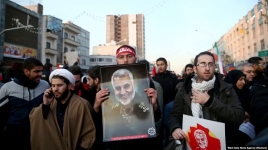Armenia Urges U.S., Iran To De-Escalate Tensions
Monday, January 6, 2020
Armenia has called on neighboring Iran and the United States to de-escalate their tensions following the assassination of Iranian General Qassem Soleimani.
Official Yerevan also pledged at the weekend to maintain neutrality in the conflict while offering condolences to Tehran over the death of the powerful commander of Iran's elite Quds Force.
Iran’s Foreign Minister Mohammad Javad Zarif and his Armenian counterpart Zohrab Mnatsakanian discussed the crisis in a phone call which the Armenian Foreign Ministry said was initiated by the Iranian side.
“On behalf of the Government of Armenia, Foreign Minister Mnatsakanian expressed condolences to the Government and people of Iran on the demise of the high-ranking Iranian official,” the ministry said in a statement.
It added that Mnatsakanian also “stressed the importance of preventing further tensions and de-escalating the situation through peaceful means.”
“Iran is a friendly country for us and the United States is a friendly country for us,” Prime Minister Nikol Pashinian said later on Sunday. “In this situation we certainly cannot be drawn into anti-Iranian actions. We cannot be drawn into anti-American actions either.”
“So our message is that our partners in Iran and the United States should refrain from steps that would aggravate the already tense situation in our region and international relations,” Pashinian stressed in a live video address which he aired on Facebook during a hiking tour in northeastern Armenia.
Yerevan was quick to express serious concern after Friday’s U.S. strike in Iraq which killed Soleimani as well as other Iranian military officials and their Iraqi allies. But unlike Russia, Armenia’s main ally, it stopped short of explicitly condemning the assassination.
Soleimani’s killing raised fresh fears in Yerevan of a direct military conflict between the U.S. and Iran which could further complicate Armenia’s transport and trade links to the outside world. Armenia’s top diplomats and military officials discussed potential consequences of the crisis at separate emergency meetings held on Friday.
With Armenia’s borders with Azerbaijan and Turkey closed due to the Nagorno-Karabakh conflict, Iran as well as Georgia are the landlocked country’s sole conduits to the outside world. Successive Armenian governments have therefore maintained cordial relations with Tehran.
Pashinian has repeatedly made clear over the past year that his administration will seek closer Armenian-Iranian political and economic ties despite the U.S. sanctions against the Islamic Republic. He insisted in August that Washington is not pressuring Yerevan to curtail those ties.





